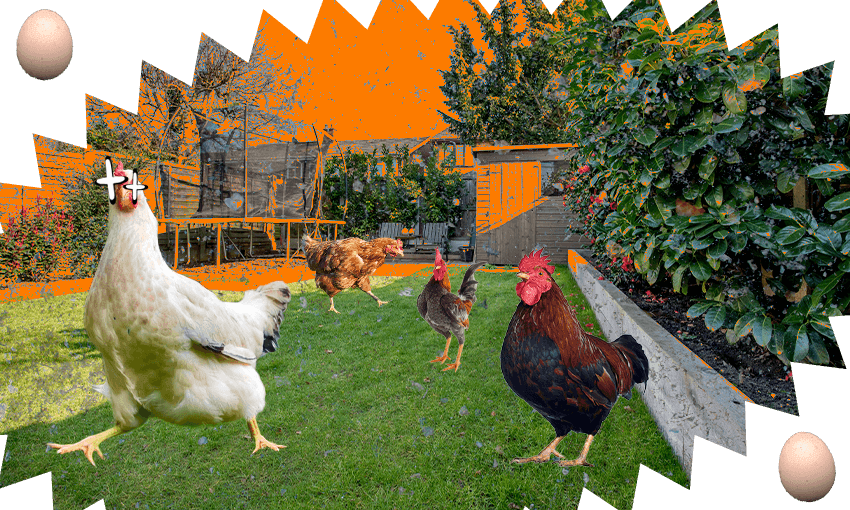Considering getting a few chooks to cope with the egg shortage? Here’s what you need to know before you do.
In a suburban West Auckland backyard, a pecking order has been established. Despite being the smallest chicken, Ivy, a Brown Shaver, gets the first pick of food scraps, and has the run of the coop. If there’s a fight looming, Poppy and Rosie, both Barred Plymouth Rocks, know to get out of Ivy’s way. “If scraps are thrown over, Ivy’s like, ‘Nup, I’m getting those,'” says their owner, Keryn. “She’s always first.”
There’s a hierarchy, but companionship is important for chickens. So is the right amount of water, food, grass, fresh air, shade and plenty of love. Keryn’s family of five has been providing their three home chickens with all that for the past five years, domesticating them so much they don’t mind being carried around by her kids. “They live a life of luxury in our backyard,” she says.
In return, her family gets pets that are friendly, fun and full of personality. Ivy’s bossy, Poppy’s the shy one, and Lizzy likes to explore. Once, despite having her wings clipped, the family found Lizzy over the fence hanging out on their neighbour’s deck. Ivy and Poppy were so worried about her they didn’t stop squawking until she was rescued.
They give this West Auckland family plenty of joy – and a fair bit of mess to clean up. “They poo everywhere!” says Keryn’s daughter Delilah. But one thing they don’t get is an abundance of eggs. Together, the three chickens supply about six eggs a week – fewer if the weather’s cold, or if they haven’t been eating the right food.
That’s because a chicken’s best laying years are before the age of two. After that, egg laying slows down, and often stops. Commercial egg producers often dispatch them at this point, maintaining a continuous rolling flock of younger, more productive chickens. At home, getting rid of chickens that play with the kids is a little more difficult, and it’s something Keryn’s family refuses to do.
So, despite owning three egg-laying chickens, they’re still forced to buy eggs at the supermarket if they want to scramble them regularly for breakfast. Just like everyone else, they’re susceptible to market fluctuations and price rises.
Lately, that’s an issue on everyone’s minds. With farmers adapting to new rules banning battery hens, and with smaller egg suppliers closing shop during Covid, restaurants and cafes open full force after years of lockdowns, and international cruise shops stocking up on supplies when they berth, eggs are suddenly in short supply.
That’s led to skyrocketing prices and restrictions being put in place at many supermarkets. Bakeries are finding the math doesn’t add up and they’re being forced to raise prices of everyday baked goods to a level never seen before.
This sudden scarcity of eggs has led to many considering chickens as an alternative. TradeMe reported a 129% rise in searches for chickens, chicken coops and food in early January, many seeming to form an idyllic picture in their minds of a steady supply of freshly laid eggs for breakfast every morning.
Is it like that? Not really, says SPCA CEO Gabby Clezy. “What people don’t necessarily realise is that chickens don’t lay eggs for the whole of their lifetime – and they can live for up to 10 years,” she says. “Chickens also lay less eggs in cold environments. So if people think they’re going to have a constant supply of fresh eggs, they may not in many cases.”
The SPCA often ends up with unwanted chickens. Last year, more than 370 ended up with them, 90 of those found abandoned. Clezy’s concerned about people rushing out to buy chickens without putting enough thought into it, and is worried it could push those numbers higher. “It’s an absolute commitment,” she says. “They’re companion animals and they’re there for a lifetime.”
She advises putting as much research and thought into getting chickens as any other pet. “We support the keeping of backyard chickens and other poultry, provided they’re given a good life,” she says. “It’s really important that people consider whether they have the time and the resources, and knowledge as well as the right environment to provide a safe and rich space for chickens to live in.”
That means giving them their own patch of grass with shade, fresh air and a nesting box. It means watching out for changes in behaviour, dealing with mites when they get them, and taking them to the vet when they need checking up on. It also means protecting them from predators, including any of your other pets, like cats and dogs.
It also means giving them friends. One chicken on its own is not enough. “They’re not animals that like to be on their own. They like to be with other chickens,” says Clezy. She says the minimum is three and advises owners to “make sure they have a good life throughout their life”.
That’s exactly what Keryn says her family is trying to do. Their chickens are pets first, and even though they’re not allowed in the house, they feel like they’re part of the family. Any fresh eggs the family may get from them is just a bonus. “They’re chill,” she says. “They just make nice pets.”



